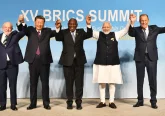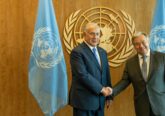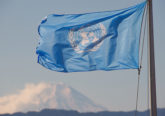
His Excellency Mr Ban Ki-moon, current Secretary-General of the United Nations, gave this year’s Cyril Foster Lecture on ‘Human Protection and the 21st Century United Nations’ on 2 February at Oxford’s Examination Schools, hosted by the Department of Politics and International Relations. HE Mr Ban Ki-moon was the 4th Secretary-General of the UN to give a Cyril Foster lecture and he was greeted by an audience of over 700 attendees, including the overflow rooms.
From the very early days of his tenure as Secretary General, Ban Ki-moon has placed humanitarian issues, and particularly the notion of the ‘responsibility to protect’, at the forefront of his agenda. More specifically, he has sought to turn ‘words into deeds’ – to translate the often lofty rhetoric of the UN into concrete actions designed to offer better protection to the populations of UN member states. As he readily admitted during his lecture, while the UN has endeavoured to engage in human protection, it has not always succeeded – for a mix of logistical and political reasons.
The Secretary General’s commitment to human protection appears to be driven by personal experience. He began his talk by reflecting on his childhood in Korea, and how the UN at that time made a tangible difference to the safety and well-being of those in his family, and countless others. In short, there is a deep authenticity about his desire to improve the UN’s record on protection.
The bulk of the talk was devoted to outlining the three main kinds of protection activities which the UN and its agencies engage in. The first set of activities is what Ban Ki-moon refers to as ‘fire-fighting’: responding to crises which threaten civilian populations. The two main tools for the UN in this regard are peacekeeping and emergency disaster relief. Both tools have evolved significantly since the UN’s founding (particularly the activity of peacekeeping, which today involves much more than simply keeping warring factions apart).
The second set of activities relate to what appears to be the Secretary General’s current preoccupation: the prevention of conflict and humanitarian disasters. Through mediation and preventive diplomacy, the UN tries to prevent deadly conflict from developing. And through its assistance to governments, it seeks to build institutions and structures that can prepare societies for potential natural disasters.
The final category of activities Ban Ki-moon describes as ‘accountability’: political and legal mechanisms that can both clarify states’ responsibilities to their populations, and hold states (or their individual leaders) to account when they fail to fulfill them. A central aspect of this accountability framework is the principle of the ‘responsibility to protect’ – endorsed by heads of state and government at the 60th anniversary summit of the UN in 2005. In the summit outcome document, states recognize that the primary responsibility to protect populations lies with sovereign member states themselves. However, if they ‘manifestly fail’ to fulfill those responsibilities, the international community, working through the UN, has a responsibility to step in and fill the gap.
Two things struck me in particular about this wide-ranging talk. First, despite the common tendency of many academics to stress the limitations of the UN (and I’m not denying they exist), it was clear that the body has come a long way. It is difficult to imagine member states of the UN in 1960 endorsing a principle like the responsibility to protect. Secondly, however, Ban Ki-moon’s overview of the UN’s human protection activities was a sober reminder that the UN is only as good as its member states. The Secretary General can only ask states (and in some cases implore them) to live up to their responsibilities. It is national governments that must heed that call – through financial, military and political support.
As we know, that support is not always forthcoming. Indeed, while it is popular to say that the UN ‘failed’ in Rwanda in 1994, that is only partly true. It was particular states, largely in the Security Council, that really failed. More broadly, today there remain many states that continue to fear the implications of recognizing the imperative of human protection, as they believe it might undermine the cherished principle of state sovereignty.
Please visit the Oxford Institute for Ethics, Law and Armed Conflict website where you will find a Policy Brief on Implementing the ‘Responsibility to Protect’.
A transcript of the lecture is available at the UN News Centre website.
Jennifer Welsh is Professor in International Relations, University of Oxford and Co-editor (with Vaughan Lowe, Adam Roberts, and Dominik Zaum) of The United Nations Security Council and War: The Evolution of Thought and Practice since 1945, (Oxford University Press, 2008) and (with Ngaire Woods) of Exporting Good Governance: Temptations and Challenges in Canada’s Aid Program (Wilfred Laurier University Press, 2007).
Photo courtesy of Alessandro Iandolo: Prof Andrew Hamilton, Vice-Chancellor, with HE Mr Ban Ki-moon.
Click here to see the full video of the 2011 Cyril Foster lecture.







2 Comments
Please could you include the questions that were asked and the answers given by His Excellency Ban Ki Moon
It is hard to comprehend that H.E.Ban Ki-Moon understands anything about the concept of human protection and/or the concept of Responsibility to Protect or if he does understand these concepts, that he does care about these beyond electioneering speeches. His total speech fails to mention Sri Lanka even once. During his two visits, he failed to talk to the democratically elected Members of the ethnic Tamil community or to find out about their concerns even in an indirect manner. Would he be able refute the charge that upto 40,000 civilians may have been murdered by a callous government. Would he be able to refute the charge that many invalid people may have been buried alive during that war by the Sri Lankan Army? Would he be able to deny that many children who were below 6months of age were detainees in detention camps? Would he able to confirm the number of children who died of starvation and malnutrition in the camps? Would he be able to confirm or deny the accusation by the then Sri Lankan Minister of Rehabilitation (as reported by the BBC) that it was the UN that was delaying the construction of facilities for detainees to relieve themselves? Is it a mistake that the lecture was advertised as supposedly dealing with Human Protection? The tragedy continues deep into the 21st century!